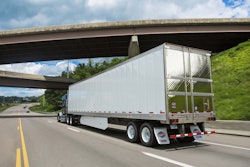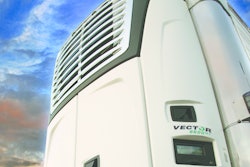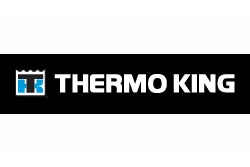
Time is money. And as the demands for faster shipments and deliveries continue to rise, food and beverage distributors are certainly noticing the effects. Not only must they distribute products quickly to ensure they maintain optimum shelf life, they also need to keep an eye on product loads, freight damage, temperatures, and of course, their bottom lines.
To alleviate the stress, the following four companies are offering ongoing engineering and design advancements for refrigerated trucks and trailers, as well as refrigeration units, to provide distributors more options for their perishable goods, a longer shelf life, and ultimately, an increase in profits.
1) Carrier Transicold
To help food shippers and fleets comply with the Food Safety Modernization Act (FSMA) transportation rules that came into force this past April, Carrier Transicold is now offering its DataLink 2 recorder, an independent temperature monitor and recorder for refrigerated trucks and trailers.
Using up to three independent temperature sensors, the DataLink 2 system can be used for either single- or multi-temperature applications, offering food distribution operations another means to track and manage the type of information they need to achieve their FSMA compliance goals.
Not to mention, the system also features an integral thermal printer, so that drivers can easily produce graphical and numerical trip reports for receivers, while also downloading data into their personal computers for electronic logging.
“Increasingly, haulers of perishable and frozen foods are using temperature monitoring and reporting capabilities, with temperature accountability a growing focus following the release of the transportation rules of the FSMA,” says Mark Fragnito, product manager, controls for Carrier Transicold.
In addition to providing temperature monitoring and reporting capabilities, Carrier Transicold has also redesigned its Cab Command controller for its Supra truck refrigeration units, so that they can be mounted in the dashboard. Featuring an interface in an advanced, compact design, the new controller conforms to the DIN specification, so that it can easily (and cleanly) be installed in a truck cab’s dash.
“Operators like the Cab Command controller because of its ease of use and functionality,” says Scott Parker, product manager, truck product products at Carrier Transicold. “Our latest version offers the convenience of in-dash installation or, when used with an optional surface-mount bracket, it can be located on an overhead console, underneath or on top of the dash, giving users a wider range of placement options.”
2) Kindeyne
More often than not, food and beverage containers have odd shapes and sizes that prevent them from being easily stacked on top of one another in a trailer. In addition, they can also be easily damaged, leading to product losses, extra expenses for replacements and, eventually, a noticeable decline in bottom lines.
But these issues can be better managed as a result of Kinedyne’s state-of-the-art Kaptive Beam Decking System, which allows fleets to reduce their run schedules and overhead costs. The primary reason? By handling mixed cargo, diminishing double stacking and reducing load shifting, the system can help decrease freight damage, as it lowers the number of drivers, tractors and trailers that are needed to move the freight—since they can actually maximize the capacity of the load they’re transporting.
While decreasing damage claims by upwards of 50 percent, and doubling refrigerated trailers’ load capacity, the system can also increase the profits on every load that is carried—by 25 to 50 percent. Furthermore, it can also be retrofitted on a majority of dry van trailers and spec’d on new refrigerated trailer builds by every major OEM.
“By increasing trailer load capacities by as much as 50 percent, the Kaptive Beam Decking System enables fleets to increase their profits substantially,” says Paul Wolford, vice president of sales and marketing for Kinedyne. “With the Kaptive Beam, fleets can significantly improve the capacity of every load they move.”
3) Stoughton Trailers
As Stoughton Trailers prepares to enter the refrigerated trailer market in 2018, it is currently developing a product that will be competitive in three primary categories: weight, cost and thermal performance.
To achieve these key objectives, the new refrigerated trailer will feature a composite, lightweight and durable rear door that enhances thermal efficiency, as well as an insulating process that ensures it is fully insulated at all connections. At the same time, the trailer will also offer users a six-inch or two-inch aluminum integral floor scuff (with a 12-inch or 16-inch integral liner scuff) to help prevent potential damage during loading and unloading—a significant cost reducer.
In addition, users’ cargo will be well protected from any type of weather condition, as the trailers will also feature a standard triple wiper seal door gasket to prevent water intrusion.
“By strategically integrating the use of structural composites in areas that augment thermal performance and decrease trailer weight—without compromising repair and maintenance practices that are familiar to the industry—Stoughton’s refrigerated trailer will be competitive when it enters the marketplace next year,” says Todd Eicher, director of engineering for the Diversified Trailer Products Division of Stoughton. “Also, to eliminate any components that could rot or decay over time, the trailers will not contain any wood products, thus extending their service life.”
4) Thermo King
Without question, there is nothing more detrimental to a food or beverage product’s shelf life than a refrigeration unit that requires unplanned maintenance. A well-designed unit must never be taken for granted. There are simply no exceptions.
“For that reason, Thermo King continues to invest engineering resources in the testing and overall improvement of the components and systems that support the daily operation of our trailer refrigeration units (TRUs),” says Tom Kampf, product manager for Thermo King.
Developed with customers’ unique business needs in mind, the company currently offers four >25 horsepower units (known as the S-Series) and two <25 horsepower units (known as the C-Series), which can be utilized for single-temperature or multi-temperature product applications.
Of equal importance, the >25 horsepower units (the S-Series) also provide an increased pull-down capacity in hot environments, as well as quicker recovery from door openings.
“This is an important consideration for both single-temperature and multi-temperature distribution applications, which require the trailer to return to its set point quickly—a critical element in ensuring that food and beverage products have a longer shelf life,” Kampf explains.
To further guarantee optimal shelf life for food and beverages during transport, accurate temperature control is also necessary. Therefore, Thermo King offers two operating modes: Continuous Run and Start/Stop.
“The Start/Stop mode, in particular, not only helps increase the unit’s efficiency, but—given that our Return Air Sensor is located on the side of the evaporator, rather than below it—our customers can be reassured that the temperature they are reading outside of the trailer accurately mirrors the air temperature inside of it,” he adds.
Chris Lewis is the owner of Innovative Written Solutions, a content development and editorial services company. In addition to Food Logistics, he has also written for a variety of organizations, including the Golf Channel and St. Jude Children's Research Hospital, as well as industries like engineering, higher education and workforce solutions. He can be reached at [email protected].















